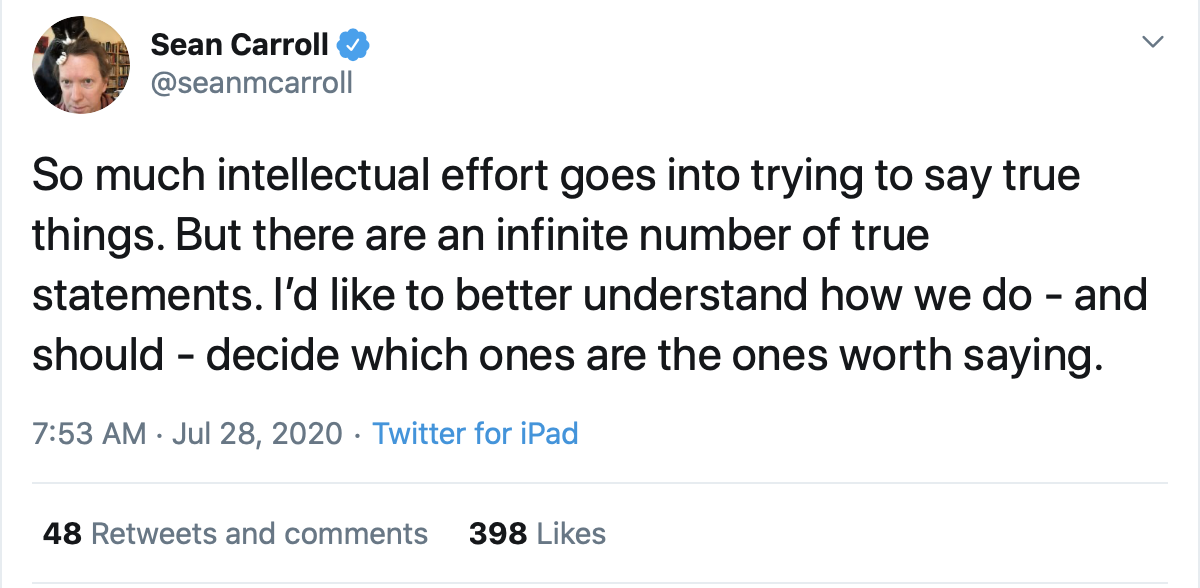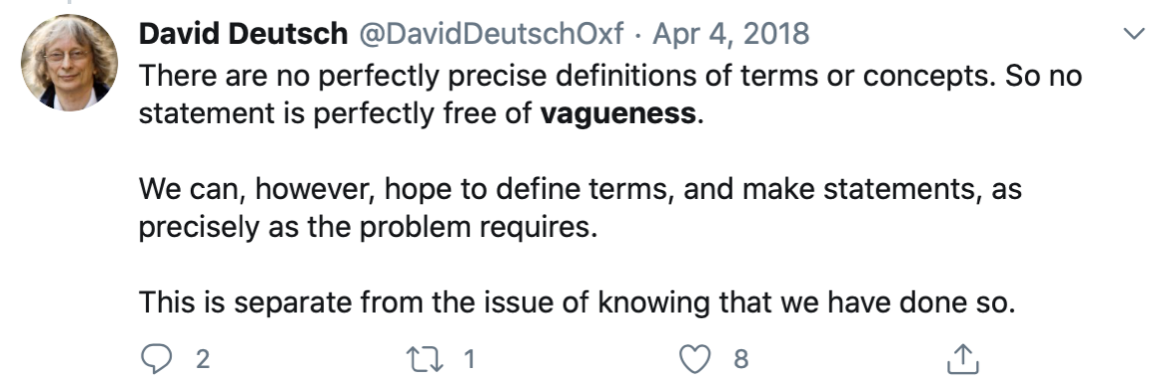|
I found this an interesting Tweet because in just 3 sentences a remarkable number of claims to object to have been packed into Twitter's character limit. I want to enumerate 3 of them. I begin with the strictly technical. 1. The second sentence says that there are an infinite number of true statements. This is wrong for a technical reason in logic. A statement has no truth value. Only propositions do. Granted, Twitter is not a reading and debating room for philosophical or mathematical logic. Nevertheless, if a tweet is ostensibly philosophical and about logic - we should aim for precision. So there are no true statements. There are only true propositions. But people cannot utter propositions which is why logicians use variables like “p” or “q” to stand in their place. For more on this distinction, see: https://www.buffalo.edu/content/cas/philosophy/events/bl-colloquia/_jcr_content/par/download/file.res/SPJSF.PREPRINT.pdf As that paper admits, there are edge cases. And why? Because, again, we can only use statements even in our definition and discussion of propositions. David Deutsch once had something to say on this point: There are also many more ways of being wrong than right. A far better emphasis is that: there are infinitely many ways of being wrong on any issue where one could potentially be right. The truth - any amount anywhere - is very very hard won. Error is the normal state of things. Yet Sean’s sentiment is that the truth can almost be tripped over and because it is so easy to find the truth (because “there are infinitely many true statements”) the problem is in choosing among all this truth. But that is not our circumstance at all. The infinite sea of misconception and falsehoods really do run deep - far deeper. Don’t be afraid of truth: celebrate getting nearer to it. Misconception is also nothing to fear but accept that it is ubiquitous and it is choosing among misconceptions and choosing which misconceptions to concentrate upon that is more like the challenge before us.
2. On the first sentence in Sean's tweet above: a less technical error and more a matter of psychology or motivation of intellectual pursuits (or anywhere else for that matter: intellectual activity is on a continuum with every other activity. Theoretical hydrological engineering is no doubt an intellectual activity...but it is not entirely disconnected at all from clearing blockages in a toilet). Are intellectuals really trying to say true things as the first sentence claims? I find it misleading to claim they are because in science (or anywhere else) people are trying to solve problems. Whether they would describe - of their own intellectual work - it as a primary attempt to say “true things” is something we should doubt. In truth we should expect each solution or theory or explanation given by the intellectual to contain some error. There is no error free state and though it might not be a consciously understood theory by many of them, intellectuals tend to seem to accept their fallibility: that, broadly speaking, they could be wrong. And so they are often not trying to have the final error-free word: which is to say trying to say true things. So I doubt the first sentence. I think intellectuals are better described as trying to solve their most pressing problems and trying to say things that approximate the truth in some ways. 3. Of the last sentence, I also do not have a technical objection. But this one is perhaps the most important: It says: “I’d like to better understand how we do - and should - decide which ones are the ones worth saying.” So the concern here is about which true things we should say (putting aside for just the moment that saying true things is, as we have seen, technically impossible). What this injunction is about is a policing of the mind. It is already the case that the mind is an error correction machine: within a single mind much can (and is!) be criticised successfully and rejected without it ever being uttered. But it is impossible to have all the best criticisms in hand and other minds and other voices are often very good to bounce ideas off. We cannot prophesy beforehand what conjecture might actually be useful. We are fallible. The idea that we can have a recipe or plan or other set of rules that can help us decide what to say and not is a form of tyranny. Given that we have already established that there are not an infinite number of true statements - indeed that we cannot think “true” claims. At best we have approximations - then given all we have are approximations, given our best attempt at getting to the truth or solving the problem - we should feel free to share our ideas. But we are being told by so many quarters right now to be careful what we say; that this or that term or word is damaging. This chilling effect is stultifying debate and making younger people fearful. It is becoming the moral zeitgeist right now: an agitation to be the first to proclaim what else should not be said. So the misconception here is that public intellectuals should be standing up for, or compiling further criteria for standards about what not to say. We have already been given so many reasons to avoid saying what should be said for fear of reprisals or pile ons or even actual violence in response to mere words: there is a pervasive culture especially on social media and in the media and on campuses that might be called a culture of social compliance. There is a quiet from some quarters and there has been a chilling effect on debate such that the idea that right now in 2020 we need more criteria for not saying things. Few people have so very many things to say publicly that their major concern is in determining how to sift what should be said from what should not. The main problem for most people is either in having too little to say (period) or too little courage to say what is really on their minds. This latter concern is not an especially new phenomena, but there is a local maximum in the historic landscape when it comes to 2020 and pressure to say what one side (and sometimes the other) in politics deems is correct speech. What I grant may have been lost in determining "what are the ones worth saying" are simple traditions of courtesy, respect and politeness. There are cultures where traditions of what is worth saying and what is not have generated some rather robust ways of avoiding the truth when it needs to be said. But on the other hand these cultures can also help people to avoid the pitfalls of simply saying whatever happens to pop into their head an commit faux-paxs. The problem we have now is that older "traditions of criticism" that might be called "polite society" have themselves been rejected for either "just deliberately offend people you disagree with" or "you must obey our language codes for fear of violent reprisal". Norms in polite society already had distilled out much that would have been called "offensive" - but much of that is being overturned in an attempt to artificially engineer culture rather than allow it through the slow trial and error evolution of culture that has typically occurred throughout human history...except for all those times politics gets involved by insisting on this or that code of behaviour. Whatever the case, what we do need right now is not more new criteria for helping to decide which things are worth saying (for this is rarely actually a problem for anyone) - but rather we need more straight forward honesty coupled with courage. We need more people to feel free enough to genuinely try to utter explanations of one's own best guessed solutions to problems: without fear of the mob (or in some places government censorship and retribution). We especially do not need the additional abstract fear that one might be failing to do the impossible: like utter "A Truth" for fear it wasn’t worth saying. ----- Important inspiration for all this comes from a Tweet by David Deutsch, reproduced below.
1 Comment
Josh Samuel
7/28/2020 01:33:14 am
Nice post. I think there’s another interpretation of Sean’s Tweet which is that we should choose carefully which problems we pursue to solve. A topical example might be whether we focus on understanding whether a particular historical figure was truly culpable for his involvement in the slave trade (perhaps from Sean’s perspective this might be seen as choosing to make statements that serves to exonerate people with dubious legacies) vs choosing to focus on understanding the problems wrought by historic slavery and more recent or even present day discrimination (choosing to make statements that serve to elucidate the discrimination that still haunts us).
Reply
Leave a Reply. |
Archives
December 2023
CriticismThe most valuable thing you can offer to an idea Categories |



 RSS Feed
RSS Feed